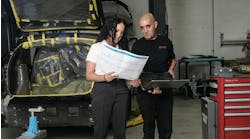There’s an old saying in the automotive repair world that everyone who’s ever worked in an auto shop has most likely heard at some point: It’s not a car business, it’s a people business.
Collision repair is as much about making and maintaining good relationships as it is about fixing cars. Whether its with customers or your technicians, having solid, effective communication is crucial to running an efficient operation.
There is no one-size-fits-all approach to communication. Cliff Sullivan, owner of Premier Coach Automotive in California, says the sooner managers recognize that, the better chance they’ll have of developing more meaningful, healthy relationships with employees.
“Your (communication) style should be a moving target. You don't have one employee that's the same as another. My style adapts to my employee based on their needs and wants,” Sullivan says. “It's not only with the guest where you have to exceed their needs and wants.”
Communication is critical, and making sure your shop is communicating well can help pick up productivity, help keep your employees engaged and make sure your customers are happy and satisfied.
Getting Started
It can be easy to get bogged down in the day-to-day operations of collision repair to actively think about what you’re communicating to employees, much less how you’re communicating.
Sullivan says there are many different communication styles that work well to build trust and mutual respect between a manager and their employee. In order to figure out which one works best for you and any employee, though, you have to take the first step.
“People forget that you just have to communicate,” Sullivan says. “I have conversations with my employees. I know my employees, I know their families, and I pay attention to the details. I'll stop and have a conversation with them, not as my employee, but as a human being.”
Having conversations is critical to building relationships. Once you start having conversations, discovering your style with different employees becomes more feasible. Still, there are issues that can arise.
Bob Pearson of Pearson Auto Body in Shakopee, Minnesota, says if someone isn’t responding well to your attempts to talk to them, be curious and ask questions.
"If you have a disgruntled person or someone who is otherwise not responding well to your communication, there's a good chance that something is upsetting that person,” he says. “Anything from working conditions to personal life and health issues. There can be a lot of reasons why you're getting resistance. Dive deeper and ask questions before you start laying into someone."
Additionally, being intentional about what you say to an employee and how you say it is crucial in starting off on the right foot. Pearson says he’s conscious about how he talks to his employees, such as phrasing requests as questions. Even more granularly, he says focusing on the actual words he uses has helped tremendously.
“Knowledge of the English language is critical,” Pearson says. “Being able to use the right words, descriptive words that paint the picture of a desired outcome, allows you to be short and effective. You’re talking to productive people that want to do good work. Keep it short and sweet.”
Do Your F---ing Job
Many people in the collision space are self-motivated and are proud of the work that they do. Most people want to do a good job. Sullivan says having clear expectations and letting people do their work creates an environment conducive to building strong work relationships.
“New England Patriots coach Bill Belichick says it best: 'Do your f---ing job,'” Sullivan says. “When we each are enabled to do our job, you won't find a better customer service experience out there.”
Pearson agrees and says keeping a productive environment alive and well helps keep everyone in the shop happy. To help maintain that environment, he says he became a “one-minute manager,” addressing small issues as they came up immediately before they festered and became bigger.
“If I saw something that rang my bell, whether it's a person or a process, I dealt with it right when it was immediately fresh,” he says. “Sometimes talking a week later is not a good idea.”
Another initiative Pearson took to help increase the open flow of information in his shop was to implement daily 15-minute production meetings. Though he initially received pushback on those by some employees who thought they were a waste of time, he says his employees realized that knowing what was happening with every car in the shop helped them do their jobs more effectively.
“Great shops do production meetings, and they might do it more than once a day. You plan your day in the morning, and then in the evening you have a wrap-up of your day,” Pearson says. “It's not going to work for every size shop, but if you do it correctly, it can be the birthplace of your culture."
Pearson talks about culture often and strives to make sure that his employees feel valued and respected. Over his 50 years in the industry, he says the one piece of advice that has helped more so than any other is to keep promises.
Keeping notes on what you tell your employees and making sure you follow through is a big deal and can help cement your role as a fair leader.
As general manager, I'm very involved with my technicians because I was one,” Pearson says. “If you don't follow through, your employees will determine you to be irrelevant and view interactions with you as a waste of time.”
Building trust with employees is essential. Making sure your people are happy will help them make your customers happy.
“It's never been about the cars,” Sullivan says. “It's always been a people business, and in a people business you can't not communicate and be successful.





